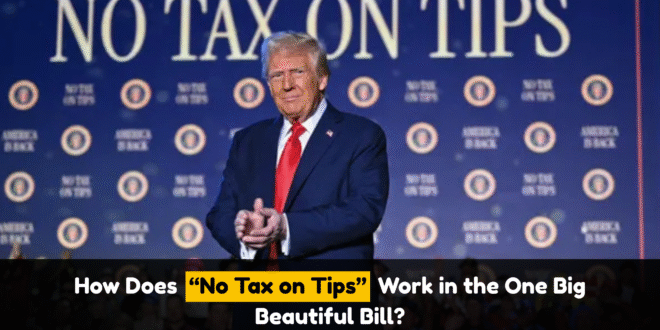No Tax on Tips in the One Big Beautiful Bill refers to the new federal provision allowing certain tipped workers to deduct tip income from their taxable income—effectively eliminating federal income tax on tips up to a capped limit for tax years 2025–2028.
Overview of the Tip Tax Provision
Under the One Big Beautiful Bill, signed into law on July 4, 2025, eligible tipped employees may deduct up to $25,000 annually in tip income from their federal taxable wages. This includes cash or charged tips voluntarily given by customers and shared among qualifying workers. The deduction applies to occupations designated by the IRS as routinely receiving tips as of December 31, 2024. No Tax on Tips is available to both itemizing and non-itemizing taxpayers, and does not reduce payroll taxes (Social Security or Medicare) nor state or local income tax obligations.
Eligibility Criteria and Phase-Out Rules
To qualify, an individual must work in an occupation listed by the IRS and report tips via Form W‑2, Form 1099, or Form 4137. The deduction phases out gradually once modified adjusted gross income (MAGI) exceeds $150,000 for single filers or $300,000 for joint filers. For every $1,000 above that threshold, the annual deduction reduces by $100 until it phases out completely.
Intended Benefit for Workers
Supporters argue the provision delivers tangible benefits to service-sector workers who depend heavily on tips—such as servers, bartenders, and stylists—giving them a boost in take-home pay. The White House estimates average tax savings of around $1,675 per year for eligible tipped workers. The bill’s framing targets middle- and working-class individuals, presenting it as a campaign promise fulfilled and a break from traditional tax policies.
Criticism and Real‑World Concerns
Critics question whether the provision truly helps those most in need. About 40% of tipped workers already earn too little to owe federal income tax, meaning this deduction may benefit higher‑earners working in tipping occupations more than low‑income staff. This could skew gains toward eight-figure tip earners like casino dealers while leaving poverty‑wage tipped workers with little or no benefit. Critics also warn that the policy might incentivize employers to rely more on tipping instead of raising wages, further entrenching subminimum‑wage structures.
Future Outlook and Practical Challenges
The deduction is temporary and scheduled to expire at the end of 2028, meaning continuation will depend on future congressional action. Employers and workers must comply with new reporting rules, including occupation classification and tip amounts, which may pose administrative challenges. Guidance from the Treasury and IRS will be issued by October 2, 2025, including a finalized list of qualifying occupations. Until then, ambiguity over eligibility and compliance remains a concern for workers and businesses.




